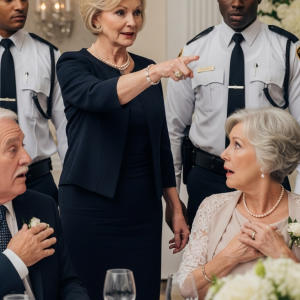The brass key felt cold between my fingers as I twisted it in the lock of my bedroom door. Christmas morning, and my own children had locked me away like some embarrassing family secret. Through the thin walls of my son Nicholas’s suburban house, I could hear them laughing downstairs, the scent of honey-glazed ham mixing with the artificial pine of their plastic Christmas tree.
I pressed my ear against the door, my sixty-seven-year-old knees protesting as I crouched on the cold hardwood. I needed to hear this. I needed to understand what had become of my family.
“Mom’s finally quiet,” Nicholas said, his voice carrying that familiar tone of exasperation he’d perfected over the past five years. “Maybe we can actually enjoy Christmas for once.” My chest tightened. I’d raised this boy, worked double shifts at the textile factory to keep him in clean clothes and hot meals after his father walked out. Now, at Christmas, I was the inconvenience.
His wife Meline’s laugh tinkled like broken glass. “Thank God. I was about to lose it if she complained about the stuffing one more time. Like, we get it, Oprah. Your mother’s recipe was better. But guess what? She’s been dead for twenty years, and we’re not running a museum here.”
The teenagers, my grandchildren, giggled. Seventeen-year-old Michael and fifteen-year-old Sarah, who used to beg for my stories, were now part of the chorus, laughing at Grandma’s expense. Something inside me cracked like ice on a pond. Not broke—cracked. When something breaks, it’s sudden. When it cracks, it’s slow, inevitable, and far more dangerous.
I stood and walked to the window. Nicholas’s house sat on a cul-de-sac of identical lawns and matching mailboxes. In the distance, a church bell chimed ten times. I sat on the edge of the guest bed, the quilt one I’d made myself thirty years ago, my fingers tracing the “wedding ring” stitches. The irony wasn’t lost on me.
My purse sat on the dresser, containing everything I owned now: $847 in cash, my ID, and a small photo of Nicholas at age seven, gap-toothed and proud, holding up a fish we’d caught. That boy had loved me once.
Downstairs, someone turned on the television. The familiar sounds of a holiday parade filled the house—normal Christmas sounds for a normal family, just not one that included me. I pulled a piece of Meline’s expensive stationery from the nightstand drawer. I stared at the blank page for a long moment, then began to write.
My Dearest Family, Thank you for making this Christmas so memorable. I’ve learned more about my place in this house in the past three days than in the six months I’ve been living here.
I paused, listening to them laugh again. The pen felt weighted with sixty-seven years of disappointment.
I’ve decided to give you the gift you really want for Christmas: my absence. Don’t worry about me. Nicholas, I hope you find the peace you’re looking for. Meline, enjoy your spice rack; it’s organized alphabetically now. Michael and Sarah, maybe when you’re older, you’ll understand.
Don’t look for me. I’ll be fine. With love and disappointment, Oprah
I folded the note and set it on the pillow. Then I opened my suitcase, the same one I’d used for my honeymoon in 1978. At the bottom, I found a business card I’d forgotten I had, from a real estate agent named Janet Waters, specializing in rural properties. I slipped it into my coat pocket.
Through the door, I could hear them opening presents. I picked up my suitcase and walked to the window. The guest room was on the second floor, but a trellis covered with dormant grapevines ran up the side of the house. I’d climbed down worse things. The window opened with a soft creak. Cold December air rushed in, carrying the scent of snow and possibility.
I threw my suitcase down first, watching it land in the bushes below. Then I swung one leg over the sill. My heart pounded with something I hadn’t felt in years. It wasn’t fear. It was freedom.
The Greyhound bus station in downtown Minneapolis smelled of disinfectant and broken dreams. My phone buzzed in my purse—Nicholas’s number. I let it ring until it stopped. By the fourth call, I pulled out the phone and turned it off completely. Whatever panic was unfolding in that suburban house was no longer my problem.
The young man behind the ticket counter looked bored. “Next,” he called, though I was the only person in line.
“I need a ticket north,” I said. “Somewhere with lakes, somewhere quiet.”
He squinted at me. “You looking for a specific destination, or just running away from Christmas? It’s Christmas Day, lady. Only two kinds of people buy bus tickets on Christmas: people visiting family, and people escaping family. You don’t look like you’re headed to a reunion.”
I almost smiled. “Grand Rapids,” I said, remembering the name from the departure board. I counted out the bills, watching my escape fund shrink to $810. As Minneapolis faded behind us, replaced by frozen farmland, I pulled out Janet Waters’s business card. Maybe some part of me had always known this day would come.
At the Grand Rapids station, I was the only passenger who got off. The main street stretched out before me, lined with shops closed for the holiday. It looked like a movie set—too perfect, too quiet. Perfect. The Northwoods Inn sat on the corner, a tired but clean three-story building.
The lobby was small and warm, with a real fireplace. An older woman sat behind the desk. “You need a room?” she asked, closing her paperback novel.
“Yes, please. Just for tonight.”
“Welcome to Grand Rapids, Oprah. I’m Rosa. I own this place.” She handed me a key. “You okay, honey? You look like you’ve had a long day.” The kindness in her voice almost broke me.
“I’m fine,” I said, then added, “Just making some changes.”
“Well, sometimes changes are necessary,” she replied, picking up her book. “The restaurant across the street stays open late for folks like us who don’t have anywhere else to go.” Folks like us. The phrase followed me up the stairs. In my room, I unpacked and found a small notebook. A therapist had suggested it years ago. I’d only managed three entries before giving up, too busy taking care of everyone else. I opened it now and began to write.
December 25th, 2024. Grand Rapids, Minnesota. I ran away from Christmas today. At sixty-seven years old, I climbed out a window and ran away from home like a teenager. And I’m not sorry.
I have $745 left, a hotel room for one night, and no plan. But for the first time in months, I’m just… quiet. And the quiet feels like possibility.
Janet Waters looked exactly as her voice sounded over the phone: warm, practical, and slightly weathered. She pulled up to the inn in a red pickup truck. “You must be Oprah,” she said, climbing out. “Most people don’t go house hunting the day after Christmas.”
“Most people don’t run away from home on Christmas Day,” I replied.
Her laugh was genuine. “Fair enough. Well, climb in. I’ve got three properties to show you. They’re all what I’d call diamonds in the rough.”
The first place was a farmhouse ten miles out of town. Two stories of white clapboard siding, green shutters, and a wraparound porch that sagged slightly but looked like it had hosted a thousand summer evenings. A red barn sat behind it, its paint faded but its structure solid.
“The owner died last spring,” Janet explained as we crunched through the snow. “Her kids live in California. Want to sell quick. They’re asking $45,000, but between you and me, they’d probably take thirty-eight.”
The interior was frozen in 1955. Wallpaper with tiny roses, a kitchen with mint green cabinets. But the windows were large, flooding the rooms with natural light. “The previous owner was named Louise Qualls,” Janet said. “Lived here for sixty years, raised seven kids in this house. Her neighbors said she was the kind of woman who never met a stranger.”
I felt a kinship with Louise Qualls, this woman I’d never met who had built a life here. “The house comes with twelve acres,” Janet mentioned. “There’s a vegetable garden, and the barn’s structurally sound.”
Twelve acres. In Nicholas’s house, I’d been allocated one bedroom. Here, I could have twelve acres of solitude. “This is the one,” I said, standing on the sagging porch. “I want to make an offer.”
Janet’s expression was kind but practical. “Oprah, do you have financing lined up?”
I thought about my $745. “I have some money. Not enough for the full purchase.”
“Owner financing,” Janet said immediately. “The kids want this place sold. If you can put down $5,000 and agree to monthly payments, they might work with you.”
Five thousand dollars. More than I had, but not impossibly more. Four days to find the money and change my entire life. It should have felt impossible, but standing on Louise’s porch, it felt inevitable.
That night, back at the hotel, I found something I’d forgotten: a Certificate of Deposit my mother had bought for me in 1985. It was worth just over $4,200. I called the bank and learned I could access the funds in two business days. Then I called Janet and told her to draw up the papers. I was going home to a house I’d seen once, in a town where I knew no one, with a plan that existed only in my imagination. It was the smartest thing I’d done in years.
Three months into my new life, Nicholas found me. I was in the garden, pulling weeds, when I heard the car door slam. I stood up slowly and turned to face my son. He looked older, thinner. Behind him, Meline stood next to their rental car, her arms crossed, wearing a leather jacket that screamed money.

“Hello, Nicholas,” I said, my voice steady. “How did you find me?”
“It took three months and a private investigator,” he said. “Do you have any idea what you put us through? Disappearing on Christmas Day?”
“I left a note.”
“A note?” Meline’s voice was sharp. “You left a note and disappeared. We thought you were dead.”
I looked at her for a long moment. “No,” I said quietly. “You hoped I was gone. There’s a difference.”
Nicholas stepped between us. “Mom, please. We were worried sick. We called hospitals, police stations…”
“I know what it was like to be locked in a bedroom while my family laughed about my ‘old lady drama’,” I interrupted. “I know what it was like to listen to my daughter-in-law say no one had patience for me. So when you ask what I put you through, I have to wonder if you’ve ever asked yourself what you put me through.”
He looked around the property, at the farmhouse with its fresh coat of white paint, the small sign by the driveway that read: Qualls’ Rest: A Place for Travelers. “What is this place?” he asked.
“It’s my home. And my business. I run a bed and breakfast.”
“A bed and breakfast?” Meline repeated, her tone suggesting I’d announced I was running a den of iniquity. “Mom, you don’t know anything about running a business.”
“I worked in a factory for thirty years, raised a son, balanced budgets, and solved problems every day,” I replied. “Turns out those are exactly the skills you need.”
“Look,” Nicholas said, taking on a reasonable tone. “We came here to apologize. Things got out of hand. Meline feels terrible about what she said, don’t you, honey?”
Meline’s smile was painted on. “Of course. It was a stressful time. I didn’t mean for you to take it so seriously.”
I stared at her. Even her apology was an insult, a masterful deflection of responsibility. “I see. So when you said no one had patience for old lady drama, that was just ‘stress talking’?”
The silence stretched between us. “The point is,” Nicholas finally said, “we want you to come home. We’ve missed you.”
“Have you?” I asked. “Or have you missed having someone to blame for family tension? For sixty-seven years, I’ve put family first. But when I needed family to put me first, what I got was a locked door and laughter at my expense. So forgive me if I’m not rushing back to a family that only remembers I exist when it’s convenient.”
His face crumpled slightly. “What do you want from us?” Meline asked, her voice tight with frustration. “An apology? Fine. I apologize. Money? We can discuss arrangements. Just tell us what it will take to fix this.”
I looked at the woman who thought every relationship could be reduced to terms and conditions. “I don’t want anything from you,” I said finally. “That’s the point. For the first time in my adult life, I don’t need anything from anyone. I’m complete, exactly as I am.”
I picked up my gardening tools. “You’re welcome to stay for dinner. But if you do, you’ll be guests in my home, not family members demanding I give up my life to make yours easier.” I walked into the house and closed the door, leaving them standing in the driveway with their incomplete apologies and their belated concern.
A year later, I was hanging Christmas lights on the wraparound porch when the phone rang. It was Nicholas.
“Mom.” His voice sounded different. Smaller. “How are you?”
“I’m well. Busy. I’m booked solid through New Year’s.”
A long pause. “Listen, I was calling about Christmas. We’d like to invite you to dinner. No pressure.”
“What’s changed, Nicholas?”
“A lot. Meline and I have been in counseling. And the kids have been asking about you. Sarah especially. She said something last week that hit me. She said she hoped she’d be brave enough to stand up for herself when she got older, the way her grandmother did.”
I felt something shift in my chest, a loosening of tension I’d carried for so long. “I appreciate the invitation, but I can’t leave. I have guests. The holidays are hard for people who don’t have traditional families. They need somewhere to go.”
“Maybe… maybe we could come there?” his voice was tentative.
I considered this. My house would be full. I’d created a chosen family of women who understood resilience, who valued kindness over blood ties. “You’d be guests,” I said. “Not family visiting family, but paying guests. Same rules as everyone else.”
“Of course. Whatever you think is fair.”
“Meline wants to know if there are any other rules,” he said after a moment.
I smiled, thinking of the house rules posted in each guest room. “No criticizing other people’s choices. No comments about appearance, weight, or age. And absolutely no tolerance for anyone who makes another guest feel unwelcome or judged.”
“Those are very specific rules.”
“They work.”
Christmas morning arrived with fresh snow. The house was full, eight guests plus Nicholas’s family, all moving around each other with the careful politeness of people learning to share space. Sarah had surprised me most. Now eighteen, she’d spent the evening before helping me prepare breakfast.
“I’m sorry,” she said as we rolled out biscuit dough. “About that Christmas. I was fifteen and stupid and I thought being mean was the same as being grown up.”
I looked at her and saw a young woman who’d learned something about compassion. “Apology accepted. But more importantly, what did you learn?”
“That families should build each other up, not tear each other down. And that I want to be the kind of woman who stands up for herself, like you did.”
After breakfast, we exchanged small, handmade gifts. Nicholas gave me a photo album he’d made, filled with pictures from better times. The last page held a single photo of me on the porch of this house, taken during his visit in March. I looked strong and content. Meline’s gift was a beautiful, professionally carved wooden sign: Qualls’ Rest: A Haven for Travelers.
But Sarah’s gift made me cry. A silver pendant shaped like a key. “It’s to remind you that you always have the key to your own life,” she said. “And that you taught me I have the key to mine, too.”
Later, Nicholas found me in the kitchen. “Thank you,” he said, drying a platter. “For letting us come. For giving us a chance to do better.”
“This isn’t forgiveness,” I said, wanting to be clear. “This is a beginning. If it’s going to work, it has to be different.”
“I know. I spent my life thinking being a man meant making decisions for everyone else. I thought I was protecting you by managing you. I was wrong.”
“Yes, you were.”
“The woman who left last Christmas was right to leave. And the woman who built this place… she’s amazing. I’m proud to be your son, even if I don’t deserve to be.” I studied his face and found no manipulation, only a startling honesty.
“You’ll always be my son,” I said finally. “But if you want to be part of my life, it has to be as equals.”
“Equals,” he repeated, as if testing the word. “I can live with that.”
That evening, I sat on my porch, wrapped in my old quilt, watching the snow fall. My phone buzzed with texts from former guests, now friends. Thank you for showing us that 67 is not too old to start over. See you next year. And one from Sarah. Love you, Grandma. Thanks for teaching me to be brave.
I had learned that revenge didn’t have to be cruel to be complete. Sometimes, the most devastating thing you could do to people who had undervalued you was to prove them wrong by building a life so rich and full that their absence was barely noticeable. But sometimes, if they were willing to change, if they were willing to meet you as equals, revenge could transform into something else entirely. Something like redemption. Something like family, chosen deliberately and built on respect. Something like home.




